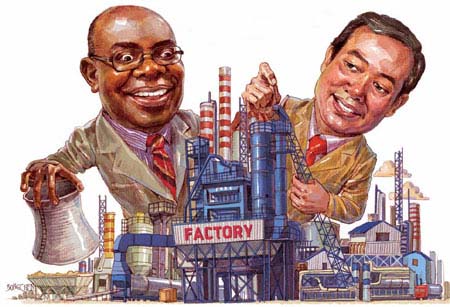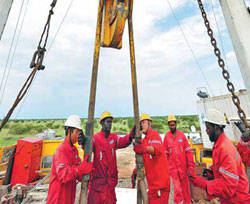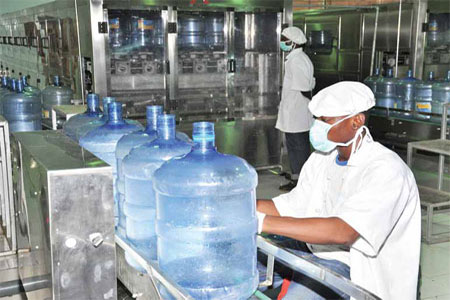
|
Nobody questionsAfrica's industrialization process - only how it should Happen, where and with whom |
|
Generally speaking, there is no argument -Africa needs industrialization to provide jobs, reduce poverty and improve economies. Also, that it needs overseas investment for this to happen, and thatChina is in a good position to provide it. But when it comes to details and practicalities, there is a great deal of debate over how this can be done, or even whether it can be done at all. There are 55 recognized countries in Africa, all differing from each other in many respects. Most may share the same problems and general wish for investment and industrialization to overcome them, but not the capabilities, conditions, cohesion or consensus needed to do so. China is currently involved one way or another in the development of more than 50 African nations, and without doubt is at the heart of the issue over the industralization of the continent. "Massive industrialization based on commodities in Africa is imperative, possible, and beneficial," states the2013 edition of the Economic Report on Africa, co-authored by the United Nations Economic Commission for Africa and the African Union, and released earlier this year. The report, "Making the most of Africa's Commodities: Industrialization for Growth, Jobs and Economic Transformation", argues that Africa needs to frame specific policies for commodity-based industrialization for each country to ensure initiatives that foster linked development, and to speed up that process through leveraging the continent's abundant resources and high commodity prices. Individually and collectively, African countries must embark on a "bold transformation" toward a commodity-based industrialization strategy to allow the continent to take charge of its own development,the report says, which is necessary if African countries are to be able to address youth unemployment, poverty and gender disparities, and other challenges. The report suggests that African countries should form industrial and other development policies to promote value-added production, and to reduce dependence on producing and exporting unprocessed commodities. Rick Rowden, a development consultant for the UN Conference on Trade and Development, says despite the important gains in services industries and per capita incomes, Africa is still not rising, and services alone will not create enough jobs to absorb the millions of unemployed youth in Africa's growing urban areas. "Instead, steps must be taken to revise WTO agreements, and the many trade agreements and bilateral investment treaties currently being negotiated, so that Africa has the freedom to adopt the industrial policies it needs in order to make genuine progress," he writes in Foreign Policy magazine. China is at the forefront in arranging bilateral investment and development agreements with African nations, most of which are impressed and encouraged by China's own spectacular economic rise. In recent weeks, Kenya's President Uhuru Kenyatta on his first official visit to Beijing echoed the wishes of many other African nations in calling on China to invest more in his country to establish factories, create jobs and boost its economy. [Read more] Huge potential Based on China's past experience and lessons it teaches, Africa has huge potential to develop industrialization, according toTeng Liliang, chief marketing officer of the China-Africa Development Fund. "African countries have witnessed China's successful build-up on the basis of industrialization during the past few decades, so now they are quite enthusiastic about doing that themselves," Teng says." But they could do better, as they have abundant natural resources and minerals as a foundation for development, which China didn't have when it started the process." Another advantage is Africa's huge population as a potential consumption market and provider of labor for the processing industries.
"Many harbor doubts about China's intentions in helping Africa start industrialization, but they should also realize Africa's industrialization would also help China in the future," he says. "From a macro perspective, China and Africa are now deeply interdependent on each other, so a better Africa makes for a better China." China now has an excess of production in many fields, including processing industry, electronic appliances and textiles, which are all desperately needed by Africa, so it's vital many Chinese entrepreneurs move factories there, Teng says. "They would be closer to the raw materials and markets, which would greatly reduce production and transportation costs," he says. According to Teng, China's skill and technology transfer to Africa would be a process of mutual learning. It is crucial for developing Chinese companies to grow alongside African skills and markets, and those who go to Africa earlier would have more opportunities. "Industrialization for Africa is a necessary foundation for any future economic boom," he says. "For China, it's a strategic opportunity to reach common development. So, from an investment perspective, it's crucial to catch the 1 percent chance and turn it into 100 percent success at this special time." [Read more] |

|
Besides the cheap consumer goods, roads and bridges it has taken to foreign nations, China should focus on creating jobs in regions such as Africa where they are needed, a former government official suggests. |
By Asha-Rose Migiro The author is former deputy secretary-general of the United Nations. The views do not necessarily reflect those of China Daily. |
||
|
Chinese businesses ready to push for Africa investment |
Services to shine in nation's trade with Africa China-Africa cooperation at strongest |

|
Keeping pollution to a minimum has been top priority for Hongxing China's spectacular growth over the past 30 years has exacted a heavy toll on its environment, and now the country's leaders are seeking to rebalance the quest for economic success and the need for sustainable development. So as Chinese companies start to move factories to Africa to be closer to raw materials and markets, and to modernize their production methods, they are paying increasing attention to how their moves will affect the environment. One such company is Hongxing Steel Co Ltd, which is grappling with the problem of pollution from its factory in Lagos, the largest city in Nigeria, even as it keeps its foot on the accelerator to keep up its rapid growth. "Most of the scrap iron we collect to make iron rods in Nigeria is of poor quality and contains a lot of oil-based paints and rubber, resulting in enormously heavy smoke when melting those iron materials," says Andy Lu, deputy general manager of the company. It has never had this problem in China, he says, and faced heavy pressure from Nigerian local authorities and residents soon after its factory opened. "Our factory is in a busy district of the city with a lot of people living nearby, and there would obviously be problems with smoke if we did nothing about it." "We knew this was an urgent problem that needed to be fixed regardless of how much it cost, otherwise we would have been unable to develop our business here," Lu says. "Our plant and equipment was imported from China and was not designed to handle heavy smoke pollution, so we had to rely on specialists in China." Those mechanical experts eventually provided the company with a tailor-made solution based on four sets of equipment to minimize smoke. "The cost was huge for us, 20 million yuan ($3.27 million), almost 20 percent of our total annual profit then," Lu says. "The problems and associated costs are still there when we need to get people over from China and import spare parts to deal with ongoing issues." Despite those costs, Lu says, if Hongxing Steel is to continue growing in Africa it must continue to spend money on equipment that minimizes pollution. An official from the local environmental authority, who did not want to be named, says: "Whatever companies produce, environmental protection is the priority as it affects the very basic life of Nigerians, and pollution can result in harm that cannot be undone." [Read more] |
Company adds tea and milk to water
Chinese company makes a difference in nigeria with its sustainable development project Setting up a manufacturing business in Africa is a tough assignment. But for many Chinese businesspeople facing dwindling profits at home, the lure of fresh markets and a potentially huge consumer base outweigh the difficulties. "My company failed in China," says Che Chao, founder and chairman of Cway Nigeria Drinking Water Science & Technology Co Ltd, which sells sanitized barreled drinking water products and other soft beverages. "I went bankrupt because of the sudden financial policy changes in China in the 1990s. I wanted to find greener pastures so I borrowed money from a friend and went to Africa." Che says after visiting several African countries, he decided to invest in a water treatment business in Nigeria, which has the largest population on the continent. "When I came to Nigeria in 1999, I found that safe, hygienic water was badly needed. I saw this as a business opportunity where I could also help to improve people's lives." Che's business has been very successful and has grown quickly. "We started off as a water company and today we are a major player in the food and beverage sector of the Nigerian economy, producing a wide range of table water, water dispensers, milk drinks, fruit drinks and tea drinks." "We now have more than six factories strategically located across the country, and employ thousands of Nigerians directly and indirectly. I prefer calling us a Nigerian company and we are proud of this." He says his company has dealt with many Nigerians and had a positive impact on many lives. According to Che, his Chinese employees are quite dedicated to their work in Nigeria and some of them have settled there. "In Port Harcourt, for instance, one of our Chinese branch managers married a Nigerian woman and they have a baby girl now," he says. Peter Oyei, a 33-year-old shopkeeper and also a consumer of Cway water in southern Lagos, says the introduction of sanitized water products has gradually changed the drinking habits of his community. "If you had come to my community five years ago, you would have seen small plastic bags strewn all over the place," he says. |

|
Kaleidoscope of successful options Joint ventures have fostered a new era of understanding, cooperation between companies By Zhang Yongpeng Chinese investment in Africa has grown rapidly in recent years, and its scope has gradually widened. Infrastructure construction contracts that predominated until 2006 are now just part of the mix, alongside agriculture, catering, clothing and textiles, energy, financial services, heavy industry, high-tech, manufacturing, processing, telecommunications and transport. The form of investment has also evolved, from initial early-stage investment to setting up factories and building oil refineries. All of that has happened against the backdrop of China's labor-intensive industries and low value-added industries being replaced by technology-intensive and high value-added industries on a large scale. Rises in the cost of labor and the impact of that on sales has resulted in many industries facing pressure to find a way out. China's industrialization is now moving to a higher level. It is in this context that African countries still in the early stages of industrialization have become an important destination for investment and development for Chinese enterprises. This shift follows a pattern industrialized countries traced 20 years ago. This has been not only to the immense economic benefit of Chinese businesses and their country but to Africa, too, whose industrialization has received a strong fillip. The investment of Chinese companies in Africa is more comprehensive than that of Western countries, as are the activities they are engaged in. They not only involve projects critical to Africa, but take in sectors that are a key to industrialization and economic development. By doing so, Africa can have its own solid industrial base, which is critical for its self-dependent capacity. China's investment in Africa has been all the more critical given the financial crisis that has continued to dog much of the world. Africa's annual GDP in recent years has been about 5 percent, which has a lot to do with China's investment. As an emerging capital exporting country, China has recognized that transforming Africa from a single-pattern economy to a diversified economic power is beneficial to China's own development. The structure of Chinese investment in Africa has gradually become more logical, moving from a traditional emphasis on primary products to manufacturing and services. [Read more] The author is a researcher at the Institute of West Asian and African Studies under the Chinese Academy of Social Sciences. |
Unlocking investment potential Chinese companies are helping urbanization, industrialization in africa with their outreach moves By Shen Lei A growing number of Chinese companies are being forced to shift the manufacturing arm of their business offshore in an attempt to combat growing domestic costs and falling export revenue. The manufacturing exodus from China comes as businesses battle with the challenge of decreased demand from developed economies, many of which are still struggling down the long road to recovery in the wake of the global financial crisis. The rising cost of raw materials in China has also seen much of the nation's manufacturing sector forced to watch company profits crushed between rising overheads and falling revenue. Driven by these two key factors businesses now face the difficult decision of raising prices and losing their competitive advantage internationally, or moving operations to a location where their goods can be produced more cheaply. Many have taken the latter option, with Africa an increasingly popular destination for Chinese businesses. Before 2007, Chinese investment in Africa was mostly made up of large, state-owned enterprises, but in recent years an influx of private enterprise has begun to flood the continent. This trend has risen to the point where, according to the Ministry of Commerce, by the end of last year Chinese investment in Africa was dominated by small and medium-sized enterprises. Of the more than 2,300 Chinese enterprises that have invested in Africa, about 170 are state-owned. The vast majority of businesses are small or medium enterprises, with much of the remainder made up of big names including the New Hope Group, Wanxiang Group, ZTE, Huawei, Lifan, and Hisense. The benefits of Chinese expansion into Africa are by no means one-sided. The growth of Chinese enterprises on the continent has simultaneously driven an expansion of African urbanization and industrialization. Employment has also risen substantially in line with the demand for local workers. [Read more] The author is a post-doctoral fellow at the School of Economics, Renmin University of China. |





